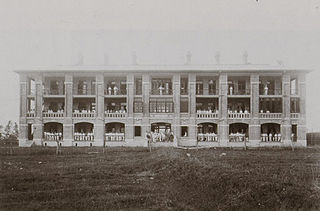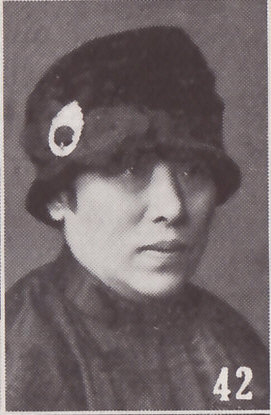Wáng Wēi, also known by her courtesy name Xiūwēi, was a Chinese Gējì, poet, and traveller during the late Ming dynasty.

Foshan is a prefecture-level city in central Guangdong Province, China. The entire prefecture covers 3,848 km2 (1,486 sq mi) and had a population of 9,498,863 as of the 2020 census. The city is part of the western side of the Pearl River Delta Economic Zone whose built-up area was home to 65,694,622 inhabitants as of 2020, making it the biggest urban area of the world.

Lingnan University was a private university from 1888 to 1952 in Guangzhou, Guangdong, China. It was established by a group of American missionaries in 1888 as the Canton Christian College (格致書院).

Ye is a Chinese-language surname. It is listed 257th in the Song dynasty classic text Hundred Family Surnames, and is the 43rd most common surname in China, with a population of 5.8 million as of 2008 and 2019.
Cantonese culture, or Lingnan culture, refers to the regional Chinese culture of the region of Lingnan: twin provinces of Guangdong and Guangxi, the names of which mean "eastern expanse" and "western expanse", respectively.

Fei Yu-ching is a Taiwanese former singer and television host.

The Cantonese people or Yue people, are a Han Chinese subgroup originating from Guangzhou and its satellite cities and towns. In a more general sense "Cantonese people" can refer to any Han Chinese people originating from or residing in the provinces of Guangdong and Guangxi, or it may refer to the inhabitants of Guangdong province alone.
Chen Wentong, better known by his pen name Liang Yusheng, was a Chinese-born Australian novelist best known for being a pioneer of the "new school" of the wuxia genre in the 20th century. Along with Jin Yong and Gu Long, he was one of the best known wuxia writers in the later half of the 20th century. Throughout his career, he published a total of 35 wuxia novels – the more notable ones include Baifa Monü Zhuan, Yunhai Yugong Yuan, Qijian Xia Tianshan and Pingzong Xiaying Lu – and some have been adapted into films and television series, including The Bride with White Hair (1993) and Seven Swords (2005).
Veronica Yip Yuk Hing is a Macau-born American actress and singer who is probably most well known for her roles in Category III films.

Lady Xian, also known as Lady of Qiao Guo, born as Xian Zhen (冼珍), was a noblewoman of the Li people, born to the chieftain of the Xian tribe in Southern China, in what is now Guangdong during the Sui dynasty. She has been deified as the "Saintly Mother of Lingnan" (岭南圣母). She died during a tour of Hainan. Former Chinese Premier Zhou Enlai called her "the First Heroine of China", and Chinese Communist Party general secretary Jiang Zemin praised her as "the role model that the later generations should learn forever". Lady Xian is depicted in the Wu Shuang Pu by Jin Guliang.

Jian Youwen was a Chinese historian, public official, and sometime Methodist pastor, known in particular for his writings on the Taiping Heavenly Kingdom. He taught at Yenching University, the University of Hong Kong, and Yale University.
The Temple of Madam Xian is a temple commemorating Lady Xian, located at Wenming Street, near the Eastern Gate of Gaozhou, Guangdong province, China. Madam Xian is revered as a symbol of unity and safety.

He Xiangning was a Chinese revolutionary, feminist, politician, painter, and poet. Together with her husband Liao Zhongkai, she was one of the earliest members of Sun Yat-sen's revolutionary movement Tongmenghui. As Minister for Women's Affairs in Sun's Nationalist government in Guangzhou (Canton), she advocated equal rights for women and organized China's first rally for International Women's Day in 1924. After her husband's assassination in 1925 and Chiang Kai-shek's persecution of the Communists in 1927, she stayed away from party politics for two decades, but actively worked to organize resistance against the Japanese invasion of China.
Jin Yi was a Qing dynasty poet from Suzhou. Born into a local gentry family, she demonstrated remarkable talent at a very young age, and surpassed all her brothers when learning to compose poetry. Considered one of the most talented students of Yuan Mei, 108 of her poems were included in his anthology of works by his female students, the Suiyuan nüdizi shixuan. In his eulogy of Jin Yi, Yuan Mei wrote: “At a very early age she could already read books and distinguish the four tones. She loved to compose poetry, and every time she let fall her brush it was like a fleet horse prancing along unable to talk.” A contemporary Qing poet, Wang Zhenyi, considered her to be an emblematic "banished immortal", akin to Li Bai. Jin Yi's complete collection of poetic works in four volumes was titled Shouyinlou Shicao.
Fang Weiyi, was a Chinese poet, calligrapher, painter and literature historian.
Cantonese folktales are folktales associated with the Cantonese people, the dominant Han Chinese subgroup in the Southern Chinese twin provinces of Guangdong and Guangxi. This body of folktales have been influenced both by the culture of Han Chinese and that of Nanyue, the original Baiyue inhabitants of the region before sinicization occurred.

Hai Qing is a Chinese actress who has appeared in such films as Sacrifice (2010), Finding Mr. Right (2013), Operation Red Sea (2018), and Return to Dust (2022). For her role in the 2009–10 television series A Beautiful Daughter-in-law Era, she was nominated for numerous TV awards, including a Flying Apsaras Award for Best Actress and a Golden Eagle Award for Best Actress, which she both won. Hai ranked 36th on the Forbes China Celebrity 100 list in 2013, 46th in 2014, and 57th in 2015. In 2015, she became the first UN Women National Ambassador for China.

The Eight Beauties of Qinhuai, also called the Eight Beauties of Jinling, were eight famous Yiji or Geji during the Ming-Qing transition period who resided along the Qinhuai River in Nankin. As well as possessing great beauty, they were all skilled in literature, poetry, fine arts, dancing and music.
Xu Yuan, courtesy name name Xiaoshu(小淑), was a Ming dynasty child prodigy and poet during the reign of the Wanli Emperor (1563-1620). Born in Suzhou to the imperial retainer Xu Shitai, she became regarded as one of the foremost female poets from Suzhou. She married fellow poet Fan Yunlin, who held various official posts in the Ming Dynasty. Xu Yuan often accompanied her husband to where he was assigned and left behind poems detailing her experiences. She retired in her native Suzhou along with her husband, who published a collection of her poetry and prose in 1613. Xu Yuan was known for her poetry to other women such as the courtesan and artist Xue Susu which often described their physical beauty and used intimate language.










